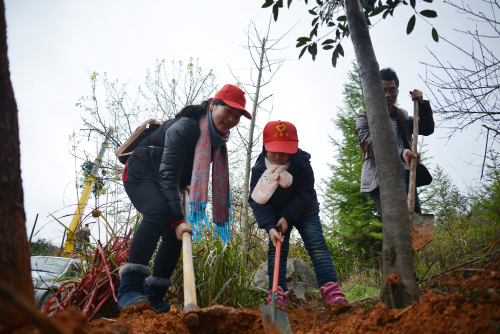|
 |
|
SPRING SAPLINGS: A girl plants trees together with her mother on February 25 in Liping County, Guizhou Province. It was the first working day after the Spring Festival holiday. Many people plant trees to mark the start of a new year (LIN SHIZHEN) |
Settling Down
China plans to abolish its controversial temporary residence permit and push forward reform of the household registration system, according to a public security reform plan released on February 15.
Permanent residence permits will be adopted to replace the temporary residence permit, according to the plan approved by central authorities.
Temporary residence permits have long been held by hundreds of millions of Chinese migrant workers, who have to apply for the permit before formally living and working in a new city.
Observers said the permit has led to instability and unsettlement and the temporary residence registry system is no longer suitable for today's situation.
Many cities in China have already ended the temporary permit system, but Beijing continues to use it.
According to the reform plan, the level of public services enjoyed by residents will depend on the duration of their residence.
Public security departments should facilitate permanent residence registration and ID card applications when applicants are not in the cities where they applied for permanent residence, the plan said.
Improving Xinjiang
Xinjiang Uygur Autonomous Region in northwest China will invest more in social welfare projects in 2015 to improve the lives of the people there, authorities said on February 25.
The government will allocate more than 72 billion yuan ($12 billion) this year to help steer 100 projects in areas such as housing, employment, agriculture and environment improvement, according to Huang Wei, Vice Chairman of Xinjiang, on February 25.
Huang said priority would be given to the region's 9,611 villages. Each village will be allocated 500,000 yuan ($80,000) to finance local transportation, utilities, environmental protection and agriculture.
He added that the government would continue to build new houses, create job opportunities and bolster the economy at the village level.
Meanwhile, 12 rural projects will be initiated this year, including the establishment of homes for the disabled and the elderly, as well as educational campaigns.
Satellite Navigation
Precision service infrastructure for China's Beidou satellite navigation system will be built on the Qinghai-Tibet Plateau as part of efforts to create a nationwide base station network for high-precision navigation and positioning by 2018.
The infrastructure will be built in Qinghai's Xining, the provincial capital, and Haidong, said an official with the First Institute of Surveying and Mapping of Qinghai on February 23.
The infrastructure is critical to practical navigation and includes base station networks, data processing, broadcasting systems and user terminals, which together will help provide more precision services.
Beidou is the Chinese equivalent of the U.S. NAVSTAR Global Positioning System--more commonly known as GPS--and Russia's Global Navigation Satellite System. Currently, Beidou consists of 20 satellites.
The system began to provide precision positioning, real-time navigation, location reporting, precise time reading and short message services for users in China and the Asia-Pacific in December 2012. The government aims to make it a global system by 2020.
| 